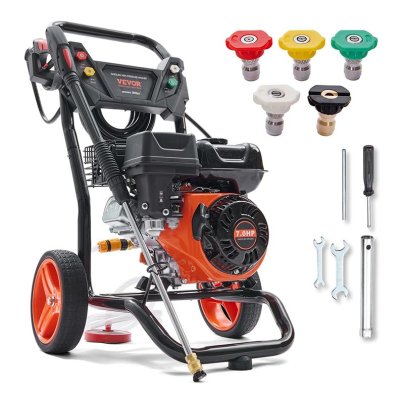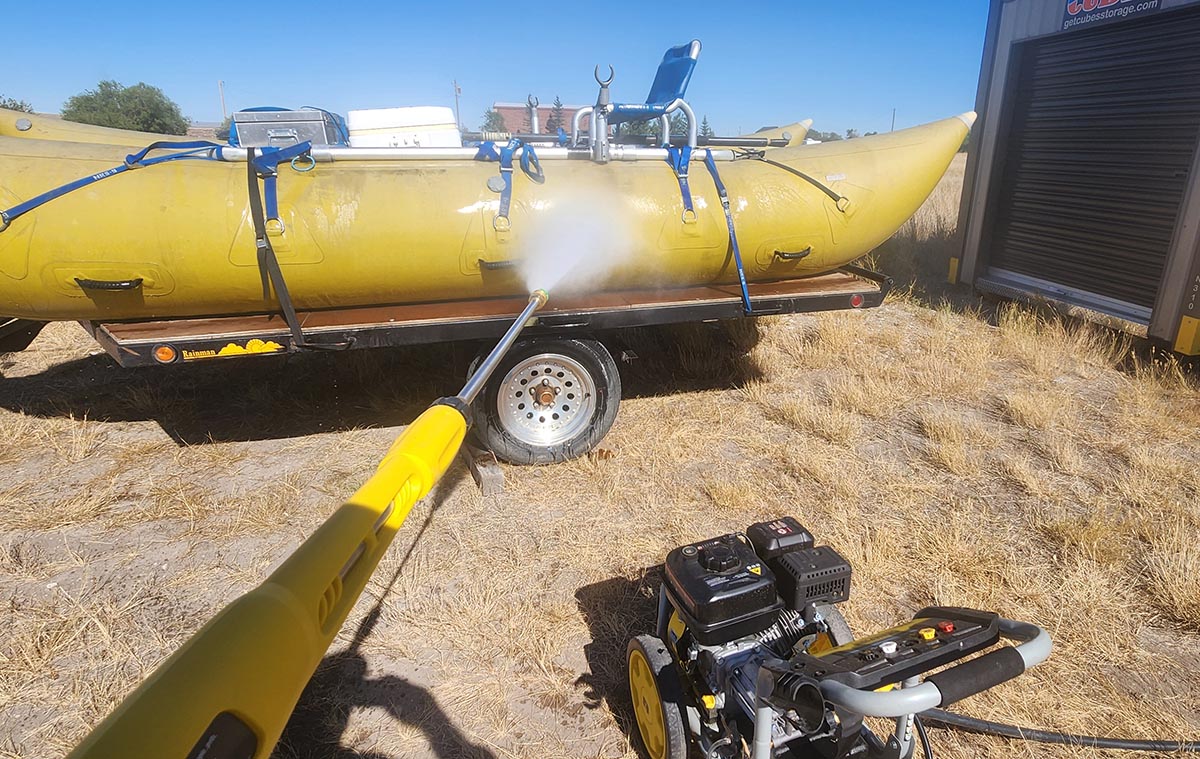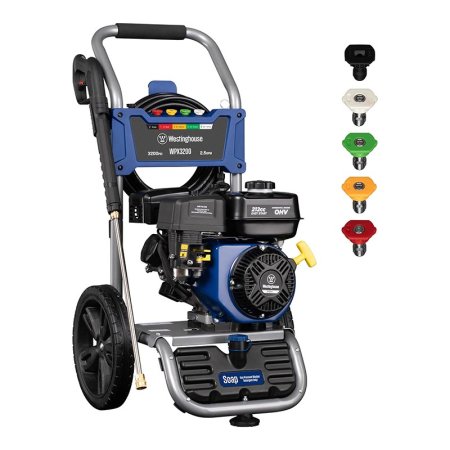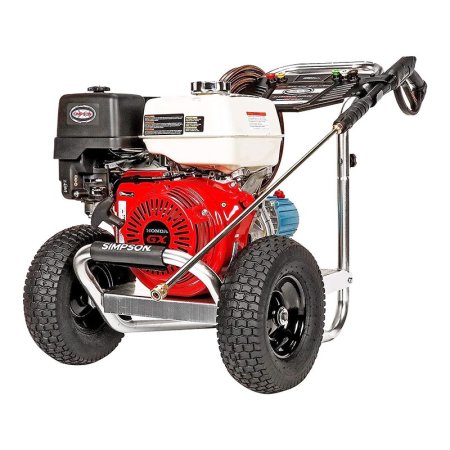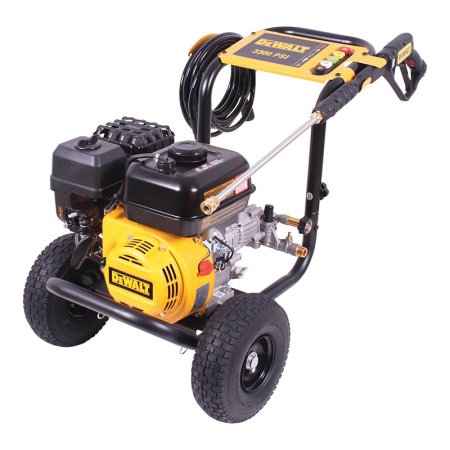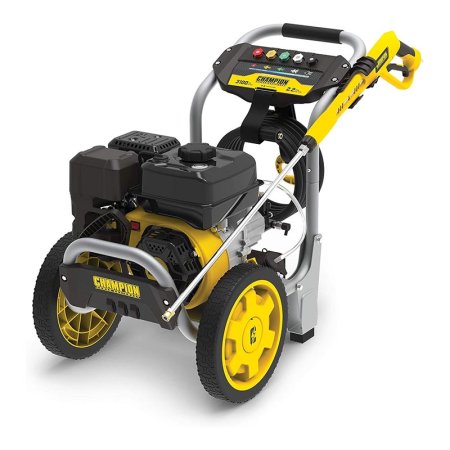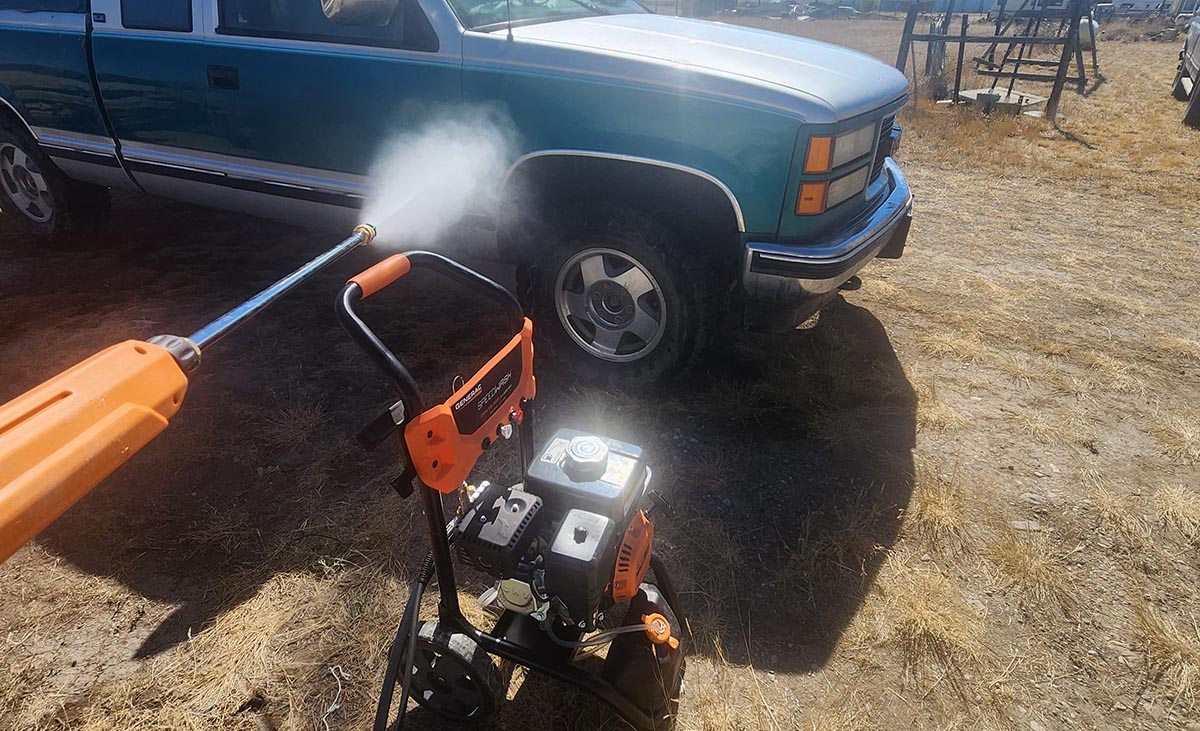
We may earn revenue from the products available on this page and participate in affiliate programs. Learn More ›
Both electric and gas pressure washers have their advantages, but gas models offer more power and longer runtimes, making them ideal for heavy-duty cleaning tasks like removing dirt and grime from concrete, cars, trailers, and siding. To help you find the right model for your needs, we spent 2 weeks testing six popular options in real-world conditions. After pitting them against each other in head-to-head testing, we scored them based on ease of setup, performance, power, maneuverability, and value.
After evaluating our test results, we identified the Westinghouse 3200 PSI 2.5 GPM Pressure Washer as the top option for most cleaning tasks. Not only is it easy to assemble and use, it also provides ample pressure, maneuverability, and durability in a well-priced package. Still, the other models that made our list also have notable features, so read on to see what we liked about each one before selecting the best gas pressure washer for your needs.
- BEST OVERALL: Westinghouse 3200 PSI 2.5 GPM Pressure Washer
↓ Jump to Review - BEST BANG FOR THE BUCK: Vevor 3600 PSI 2.6 GPM Gas Pressure Washer
↓ Jump to Review - BEST PROFESSIONAL: Simpson 4200 PSI 4.0 GPM Aluminum Gas Pressure Washer
↓ Jump to Review - BEST FOR CARS: DeWalt 3300 PSI 2.4 GPM Pressure Washer
↓ Jump to Review - ALSO CONSIDER: Champion Power Equipment 3100 PSI Gas Pressure Washer
↓ Jump to Review
Gas Pressure Washer Comparison Chart
| Product Name | Max Pressure | Weight | Hose Length |
| Westinghouse 3200 PSI 2.5 GPM Pressure Washer | 3,200 PSI | 70 pounds | 25 feet |
| Vevor 3600 PSI 2.6 GPM Gas Pressure Washer | 3,600 PSI | 58.2 pounds | 26 feet |
| Simpson 4200 PSI 4.0 GPM Aluminum Gas Pressure Washer | 4,200 PSI | 124 pounds | 50 feet |
| DeWalt 3300 PSI 2.4 GPM Pressure Washer | 3,000 PSI | 64 pounds | 25 feet |
| Champion Power Equipment 3100 PSI Gas Pressure Washer | 3,100 PSI | 69 pounds | 25 feet |
Our Top Picks
While the list of things you can clean with a pressure washer is relatively long, there are crucial details to consider to ensure you buy a model that’s effective yet won’t cause damage. As you read through the following reviews of our favorite gas-powered pressure washers, keep intended use in mind to select the machine that best matches your needs.
Best Overall
Westinghouse 3200 PSI 2.5 GPM Pressure Washer
What We Like
- Heavy-duty and durable build
- Ample cleaning ability with 3,200 PSI and 2.5 GPM (gallons per minute)
- Convenient dolly-style handle and wheels
- 5 quick-connect nozzles
What We Don’t Like
- PSI isn’t high enough for commercial applications
Specs
- Max pressure: 3,200 PSI (pounds per square inch)
- Weight: 70 pounds
- Hose length: 25 feet
Our Ratings: Setup 5/5; Pressure 4/5; Engine 4/5; Maneuverability 4/5; Value 5/5
Few pressure washers have as strong a following or as many high customer ratings as this Westinghouse 3,200 PSI model. Not only does it provide plenty of power, but it also has a great design for mobility and an easy starting engine, making it our all-around winner.
Though this unit is roughly 5 pounds heavier than many similar models, its durable steel construction makes the extra weight worth it. Plus, its wheels and handle prevented us from even noticing the additional pounds as we moved it from place to place during testing. We used it to remove caked-on mud, mold, and mildew from our driveway, brick landscaping borders, and a section of siding, and its pressure proved more than enough for every grimy surface. We also liked being able to switch between the five included spray tips and using the built-in soap tank to help tackle tougher tasks. The price is also excellent at under $350 since it does everything the $400+ range options do.
What our tester says: “We love the power, portability, and performance of this pressure washer. In fact, its spray is so strong that we had to be careful not to stand too close when using it on wood so we didn’t accidentally cause damage. Also, don’t let the fact that it’s recoil start scare you. We asked our friend’s 11-year-old son to see if he could pull start the machine, and he got it on the first try.”—Glenda Taylor, Product Reviews tester and writer
Get the Westinghouse gas pressure washer at Amazon, Lowe’s, Tractor Supply Co., The Home Depot, or Walmart.
Best Bang for the Buck
Vevor 3600 PSI 2.6 GPM Gas Pressure Washer
What We Like
- Lightweight and easy to maneuver
- Engine starts on first pull and runs great
- Great pressure and consistent output on all nozzle settings
- Excellent value with a reasonable price point
What We Don’t Like
- Low-quality fuel lines should be upgraded
- Hose kinks; difficult to unwind
- Doesn’t come with oil
Specs
- Max pressure: 3,600 PSI
- Weight: 58.2 pounds
- Hose length: 26 feet
Our Ratings: Setup 3.5/5; Pressure 4/5; Engine 4/5; Maneuverability 4/5; Value 4.5/5
Priced under $300, this pressure washer delivers exceptional value without compromising performance. Its 3,600 PSI output is impressive, and it comes with four nozzles for adjusting pressure from light to highly concentrated. It also has a convenient onboard detergent tank for running soap, and at just over 58 pounds, it may be the most portable pressure washer we tested.
This unit was relatively simple to set up, its connections were easy to manage, and its motor ran well. I did need to purchase my own oil to fill it, but once I added that and gas, it started immediately. Though we’d read reports of gas leaking from this machine’s fuel lines, we didn’t have any issues. Still, the lines are made of fairly cheap materials, so upgrading them could help prevent problems down the road.
This unit did well for a variety of household chores, including exterior cleaning and washing a vehicle. The hose tended to kink if we didn’t fully stretch it out before getting started, but this is fairly common as many hoses require some loosening to help them unravel more naturally. Overall, this is a good gas pressure washer for general cleaning tasks that won’t break the bank.
Get the Vevor gas pressure washer at Amazon or Vevor.
Best Professional
Simpson 4200 PSI 4.0 GPM Aluminum Gas Pressure Washer
What We Like
- Triple-plunger design and ceramic-coated pistons
- Reinforced construction for heavy-duty use
- 31-inch-long wand provides ample reach
- 50-foot abrasion-resistant hose
What We Don’t Like
- Premium construction comes at a premium price
Specs
- Max pressure: 4,200 PSI
- Weight: 124 pounds
- Hose length: 50 feet
Our Ratings: Setup 4/5; Pressure 5/5; Engine 5/5; Maneuverability 4/5; Value 3.5/5
This gas pressure washer from Simpson Cleaning features a powerful 390-cubic-centimeter Honda engine that delivers 4,200 PSI at 4.0 GPM. Unlike standard axial pumps, it uses a triple-plunger version with ceramic-coated pistons for enhanced durability. The unit also includes 50 feet of high-pressure hose, a 31-inch spray wand, and five nozzle options to tackle different cleaning tasks.
Despite its heavy-duty power and substantial 124-pound weight, this pressure washer was surprisingly easy to handle thanks to its aluminum frame and 13-inch pneumatic tires. In addition to being highly maneuverable, the Simpson outperformed the competition with superior power, control, and ease of use. Its Honda engine ran smoothly, and its high-quality hose offered significantly better flexibility than the stiff plastic versions found on other models. Not only that, the hose also reached further, which was ideal for moving alongside our large shop’s exterior. Given that it was the most powerful option we tested, it also did the best job stripping the paint off a wooden bench and the hood of an old truck.
What our tester says: “The only reason this model didn’t take top prize is its cost, which is more than double the price of many others. But if you need something for professional use or have to clean at a commercial level, this will be the best model. For smaller tasks and intermittent use, you might be better off with a less expensive option.”—Zach Lazzari, Product Reviews tester and writer
Get the Simpson gas pressure washer at Amazon, Lowe’s, Tractor Supply Co., The Home Depot, or Blain’s Farm & Fleet.
Best for Cars
DeWalt 3300 PSI 2.4 GPM Pressure Washer
What We Like
- 3,300 PSI is safe on cars
- Detergent tank makes it easy to use soap
- 25-foot high-pressure hose offers ample reach
What We Don’t Like
- Won’t be great for heavy-duty tasks
Specs
- Max pressure: 3,300 PSI
- Weight: 64 pounds
- Hose length: 25 feet
Our Ratings: Setup 4/5; Pressure 4/5; Engine 4/5; Maneuverability 4/5; Value 4/5
This small pressure washer from DeWalt puts out 3,300 PSI, is well built, and features an electric start that makes it easy to use. The engine started on the first pull every time and ran flawlessly throughout testing. It delivered plenty of power for cleaning concrete, metal siding, and vehicles, and the water pressure remained consistent after a few initial minutes of surging. This may have been because the hose kinked a bit at first (as did the hoses of most models), but it improved once unraveled and remained steady after that.
Though we liked this pressure washer enough to think it worthy of almost any award on this list, it may not be ideal for heavy-duty commercial tasks. Some users also reported seal failures and occasional oil leaks, but we didn’t experience either of these issues. The oil level remained steady, and the engine performed excellently. Like many other models, the sprayer mount isn’t great, but it’s not a deal-breaker. Overall, we found it to be a solid pressure washer that performed on par with other top models in our tests.
Get the DeWalt gas pressure washer at Amazon.
Also Consider
Champion Power Equipment 3100 PSI Gas Pressure Washer
What We Like
- Low profile makes it easy to load
- Great pressure and consistent output
- Quality hose that doesn’t kink
- Easy to maneuver
What We Don’t Like
- Sprayer mount could be better
Specs
- Max pressure: 3,100 pounds per square inch (PSI)
- Weight: 69 pounds
- Hose length: 25 feet
Our Ratings: Setup 4/5; Pressure 4/5; Engine 4/5; Maneuverability 5/5; Value 4/5
It was a competitive field, but the Champion 3,100 PSI model excelled in a variety of categories, impressing us most with its performance and maneuverability. In our tests, we initially started with a high-pressure nozzle for this unit since it seemed appropriate for the PSI. We ended up backing off as it was too powerful for the PVC surfaces we were working on. After some experimentation, we found the mid- to high-pressure washer nozzles perfect for washing cars and metal surfaces and the mid- to low-pressure nozzles better for our PVC raft and fiberglass boat. We also really liked using this model on our driveway, as it cleaned deep layers of dirt and grime buildup with ease.
While many other models have an upright handle, this one uses a lower profile. This makes it quite portable (even at 69 pounds) since it fits into vehicles without needing to be disassembled. The only thing we didn’t like about this pick was its sprayer mount, which is used on many pressure washers and just isn’t stable. The sprayer doesn’t seat securely and tends to fall off the mount, which isn’t a big deal but is a minor inconvenience.
What our tester says: “I find myself using this pressure washer a lot since it works exceptionally well and fits in my Subaru wagon without having to remove the handle or any other components. It’s always the model I go for when I need to move between properties.”—Zach Lazzari, Product Reviews tester and writer
Get the Champion Power Equipment gas pressure washer at Amazon.
Jump to Our Top Picks
How We Tested the Best Gas Pressure Washers
| Testing Stats | |
| Products tested | 6 |
| Time spent testing | 2 weeks |
| Tests performed | 6 |
| Price range | $300 to $1,400 |
We wanted to see how each pressure washer performed different tasks, so we tested them on a variety of surfaces. Each was used to wash vehicles and boats while cycling through different pressure settings, adding detergents, and running the engines for hours with a hose attached.
After our initial tests, we moved to more difficult surfaces by cleaning the exterior siding of a large shop. We also stripped paint from a wooden bench to prep for a new coat of paint and even stripped paint from the hood of an old truck to prep for a new layer of rust protection. Lastly, we used the pressure washers to clean concrete driveways and pathways on a number of rental properties. Once our tests were complete, we rated each model on its engine performance, ease of use, power settings, detergent integrations, hose quality, and overall efficacy.
| Product Name | Setup | Pressure | Engine | Maneuverability | Value |
| Westinghouse 3200 PSI 2.5 GPM Pressure Washer | 5 | 4 | 4 | 4 | 5 |
| Vevor 3600 PSI 2.6 GPM Gas Pressure Washer | 3.5 | 4 | 4 | 4 | 4.5 |
| Simpson 4200 PSI 4.0 GPM Aluminum Gas Pressure Washer | 4 | 5 | 5 | 4 | 3.5 |
| DeWalt 3300 PSI 2.4 GPM Pressure Washer | 4 | 4 | 4 | 4 | 4 |
| Champion Power Equipment 3100 PSI Gas Pressure Washer | 4 | 4 | 4 | 5 | 4 |
What to Consider When Choosing a Gas Pressure Washer
While most gas power washers deliver higher performance than their electric counterparts, many are still aimed squarely at general-purpose home and yard use. At the other end of the scale are heavy-duty professional machines. Understanding the following features will help you select the best gas-powered pressure washer for home use options based on which tasks you undertake regularly.
Intended Use
It’s important to use a pressure washer for the right types of cleaning jobs. Though many of the best gas pressure washers have considerable flexibility, they sometimes have too much power. In general, gas pressure washers are tools for outdoor tasks.
Medium-duty models can be used for vehicle cleaning, though using an appropriate accessory like a car-cleaning wand is a good idea. A residential pressure washer is a great choice for cleaning siding and brickwork and removing grease and oil from decking, paths, garage floors, and elsewhere.
Some pressure washers can strip rust and flaking paint before refinishing and even remove graffiti. In essence, gas pressure washers are for cleaning hard surfaces: those that can withstand the force of the water jet that’s generated.
Cleaning Performance
A gas pressure washer’s cleaning performance can be compared using three measurements: pounds per square inch, gallons per minute, and cleaning units (CU).
- PSI is the actual water pressure a unit generates. Higher numbers mean a stronger jet and, thus, greater ability to cut through dirt and grime. If starting with a high PSI, you can usually turn it down. Low PSI, which can be a challenge with an electric pressure washer, limits the jobs that can be done.
- GPM is the volume of water flow the pressure washer can supply. More gallons per minute usually indicate the ability to clean larger areas. However, both PSI and GPM are interdependent to some extent. If there is high PSI but low GPM, a powerful jet of water still is possible, but it will be very thin and thus of limited use.
- CU is simply the multiplication of PSI and GPM. As such, it’s not a performance indicator on its own but can be used to give an overall comparison among models. It’s more often quoted on electric pressure washer units (possibly because the figures are impressive) but is of limited practical value.
Motor
Gas pressure washers almost invariably use 4-stroke (also called 4-cycle) engines. Those with 2-stroke engines have their advantages on tools like chainsaws, but gas pressure washers don’t need to run as fast.
With top-rated gas power washers, a 4-stroke motor provides more reliability, lasts longer, runs more quietly, and produces lower emissions. With the stringent California Air Resources Board regulations and increasingly strict Environmental Protection Agency restrictions, several gas pressure washer manufacturers now use the term “50-state” to indicate that their low-emission motors comply with all current regulations.
The actual size of the gas engine is given in cubic centimeters. However, two motors of the same size can produce different amounts of power, so it’s useful to check horsepower as well.
Though most manufacturers produce trustworthy motors, names like Briggs & Stratton, Honda, and Kohler have particularly strong reputations for reliability and durability. Their motors are often used by other brands of gas-powered washers.
Portability
The ability to move a gas pressure washer around is a major factor. The smallest models weigh around 60 pounds, so you may be able to lift them without too much difficulty, although these units always have wheels.
Wheel types include solid plastic wheels on low-cost gas pressure washers, hard rubber tires on midrange units, and pneumatic tires on the largest machines. On big, heavy machines, the tires help spread the load and make it easier to maneuver on various surfaces.
Additionally, consider the hose length from the machine to the spray gun. Though 25 feet is common, some hoses are up to 50 feet. If greater mobility is needed, connect a heavy-duty garden hose from the water supply to the pressure washer. The selected garden hose must be able to handle at least 500 PSI.
Additional Features
Whereas electric pressure washers sometimes need a separate bucket for detergent, many of the best gas pressure washers have an onboard tank. If considering a heavy-duty model, capacity is a feature to check.
All machines come with a spray gun, which may or may not have a wand extension. There will be several quick-connect nozzles (usually between four and six) that provide for soap delivery and offer different spray patterns.
Other attachments may include a hard surface cleaner or one for vehicle bodywork. Separate accessories from independent manufacturers are widely available, but be sure to check the connector size if considering these.
Some minor assembly of a gas pressure washer may be required, and tools are almost always included. A few models even include a small amount of engine oil to get the user started.
Tips for Using a Gas Pressure Washer
Using a modern gas or electric pressure washer is not complicated, but it’s always worth reading the owner’s manual thoroughly to gain a complete understanding of your machine. It’s important to know how to turn it off quickly if there is a problem.
- Always consider safety: Never point a pressure washer at yourself or anyone else. Wear gloves and eye protection.
- Consider where debris from heavy-duty cleaning operations will go. For example, when cleaning a driveway, it’s easy to accidentally spray surrounding dirt or gravel a considerable distance, endangering people, pets, and windows.
- Only use approved cleaning products for gas or electric pressure washers. Bleach and other harsh chemicals can eat into internal seals and ruin the machine.
- Even the best gas motors need periodic maintenance to maximize their working life. It’s not difficult, and manufacturers provide instructions.
- Check the pressure adjustment before each task. Don’t assume the machine is how you last left it.
FAQs
The information above should provide a thorough understanding of the key issues affecting the performance and durability of the top gas-powered pressure washers. However, a few questions may remain, and answers to some of the most popular questions appear below.
You can use a gas pressure washer to clean all kinds of things. From pressure washing a house to cleaning cars, driveways, decks, some types of patio furniture, and brickwork—as long as you can adjust the pressure to the task, a gas pressure washer can handle the job.
Yes. Oil is vital for lubrication and cooling. A small gas pressure washer with a 2-stroke engine will use an oil and gas mix, whereas a 4-stroke machine will have separate tanks for oil. It’s important to follow the directions in the owner’s manual or you risk damaging the machine.
Regular unleaded gas is generally recommended. Some will run off 10 percent ethanol or 15 percent MTBE (methyl tert-butyl ether). Again, check the owner’s manual.
Generally speaking, setting up one of the best gas pressure washers is a straightforward process. Typical steps include connecting the hose and spray gun, adding fuel and oil, running water to prime, and then pulling the cord to start. However, it’s still smart to read the instructions that came with your machine, as not being familiar with your equipment is one of the 11 mistakes most people make with a power washer.
There are many variables, so offering an accurate time frame is difficult. Some manufacturers provide a rating in hours. If properly maintained, anywhere from 500 to several thousand hours is possible.
For home use, gas pressure washers with 1,300 to 2,400 PSI will likely provide enough power. As lighter-duty options, you should be able to get one of these reliable pressure washers for under $500. Professional-level gas pressure washers may be in the 2,700 to 4,200 PSI range and may cost more than $1,000, so it’s smart to decide how much power you need before buying one.
The choice between an electric vs. a gas pressure washer is an important decision for any shopper. While electric pressure washers are more eco-friendly and require less maintenance, gas pressure washers are more powerful due to higher flow rates, making them better suited to heavy-duty projects and tougher cleaning tasks.
As concrete has a tough texture and is easy to stain, a concrete pressure washer needs a high PSI of 3,000 or more to clean properly. In addition to considering PSI, you may also want to review the do’s and don’ts of pressure washing to ensure you use the right nozzle type and technique for this and other surfaces.
Though they are effective, gas-powered pressure washers are noisy. The average gas pressure washing machine produces 85 decibels or more during operation, which is as loud as a leaf blower. Even if you’re just using a small handheld pressure washer, it’s a good idea to wear hearing protection if you intend to use it for an extended period.
As with most indoor and outdoor equipment, recycling a gas pressure washer with a water tank should be done at a local recycling plant or junk removal service.
Meet the Tester
Zach Lazzari is a freelance writer splitting time between the great outdoors, travel, and DIY projects ranging from camper builds to home renovations and maintenance. His home base in Montana is the perfect testing ground for winter products and snow equipment. With over a decade of professional writing experience, Lazzari also covers a variety of other projects and maintenance topics for BobVila.com.
Additional research provided by Bob Beacham.

